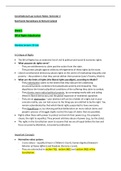Class notes
PBL2000 (Constitutional Law) Semester 2 Notes
- Course
- Institution
These are complete, comprehensive, and understandable lecture notes for semester 2 of the PBL2000 - Constitutional Law course. The lecture notes include content summaries, covering: litigating the bill of rights, dignity & ubuntu, equality, freedom of religion, the right of access to information, f...
[Show more]



